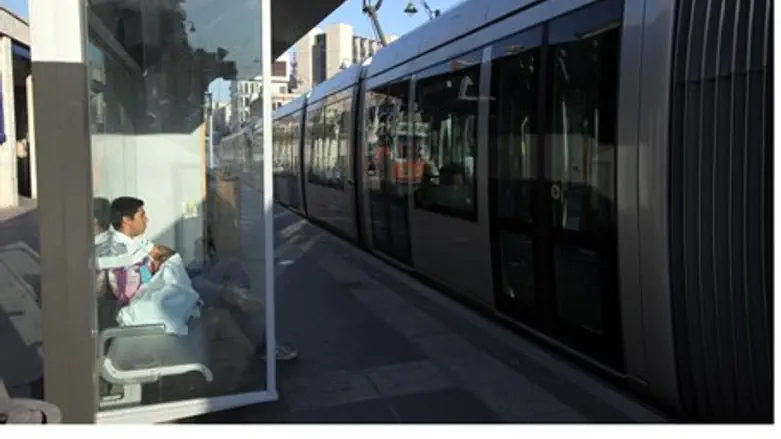
The key to changing the security situation in Jerusalem may be changing the route of the Light Rail, Jerusalem Municipality member and former mayoral candidate Moshe Leon stated Monday - as a means of forcing Arab rioters to see consequences for their actions on the large scale.
"This is a total of 1700 meters(5557 feet) that we should lay alternative track for to bypass Shuafat," Leon stated, in an interview to Arutz Sheva.
According to Leon, under the current situation - which has seen large portions of the light rail shut down for several months - some 90,000 residents of Pisgat Ze'ev and Neve Yaakov have been deprived of access to the intra-city train.
"There is no reason that many Jerusalem residents suffer from lack of access to the light rail," he continued. They are afraid of traveling on it."
"There has been a 20% decrease of light rail travel and there is no reason for it to continue that way," he added. "When the storm calms down we must go back there."
Leon insisted that a shutdown of the Arab light rail stops would lead Shufat residents to internalize the damage rampant Arab rioting has done.
As for the practical application of this idea, Leon said that Deputy Mayor Kobi Kahlon had stated that plans were already being submitted for approval by the Ministry of Transportation, and that all that remains is to set the budget.
Earlier Monday, Jerusalem Mayor Nir Barkat removed a discussion of rerouting the Light Rail from the City Council agenda - prompting Leon to fire criticism at Barkat for, in his words, promoting "the idea to not talk about terrorism or throwing rocks at residents and hiding the issues."
Violence in Jerusalem has been snowballing, with the "silent intifada" that broke out after the "revenge killing" of Arab teen Mohammed Abu-Khdeir by a mentally unwell man in July after the abduction and murder of three Israeli teens resulting in a constant cycle of violent Arab rioting.
The Light Rail has been a prime target for violence. Since the rioting began in July, between 100-150 incidents involving the rail have been recorded, it was revealed earlier this week - with the number of incidents averaging, at times, three per hour.
Forty percent of all trains have been damaged in attacks; the financial damage of the last several months is estimated to cost no less than half a million NIS (around $134,000).
And that damage may not include the huge cost of repairing damage to entire stations, after violent Arab rioters destroyed three light rail stops.